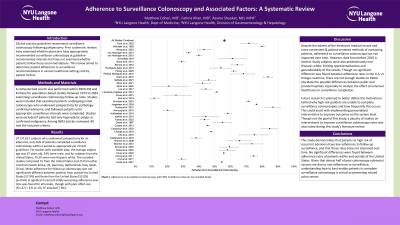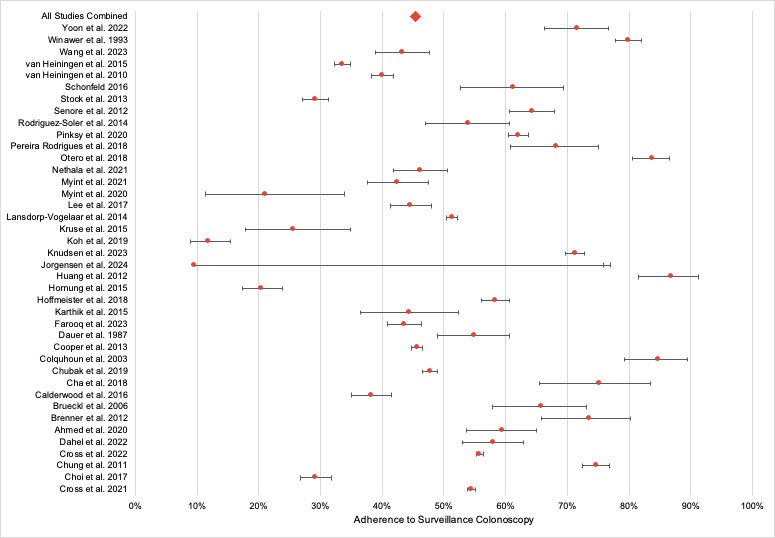Monday Poster Session
Category: Colorectal Cancer Prevention
P2138 - Adherence to Surveillance Colonoscopy and Associated Factors: A Systematic Review
Monday, October 28, 2024
10:30 AM - 4:00 PM ET
Location: Exhibit Hall E

Has Audio

Matthew F. Cohen, MD
NYU Grossman School of Medicine
New York, NY
Presenting Author(s)
Matthew F. Cohen, MD1, Fatima Khan, MD2, Aasma Shaukat, MD, MPH3
1NYU Grossman School of Medicine, New York, NY; 2NYU Langone Health, Brooklyn, NY; 3NYU Langone Health, New York, NY
Introduction: Colonoscopy surveillance is recommended by clinical practice guidelines following polypectomy. Prior systematic reviews have examined whether physicians have appropriately recommended surveillance colonoscopy at guideline-recommended intervals, but have not examined whether patients actually follow through with these recommendations. The aim of this review was to determine patient adherence to surveillance recommendations over a broad variety of healthcare settings and by patient factors.
Methods: A computerized search was performed within Pubmed and Embase for population-based studies between 1974 to 2024 examining surveillance colonoscopy follow-up rates. Studies were included that examined patients undergoing initial colonoscopy who underwent polypectomy for pathology-confirmed adenoma, until appropriate surveillance intervals were completed. Studies were excluded if patients had only hyperplastic polyp, or confirmed malignancy.
Results: Among 8693 articles reviewed, 40 met inclusion criteria. Of 137,631 subjects who underwent polypectomy for an adenoma, only 56% of patients were compliant with follow-up surveillance within a time period as appropriate per clinical guidelines. For studies with available data, average subject age was 67 years old, 54% were male, and for subjects from the United States, 79.5% were non-Hispanic white. Included studies were comprised of 15 from the United States and 25 from other countries (South Korea, UK, Germany, Netherlands, Italy, Spain, China). Mean adherence for follow-up colonoscopy was not significantly different between patients from outside the United States (57.9%) and those from the United States (52.0%) (p=0.64). For all locales, a significant trend of mildly worsening adherence over time was found, though with poor effect size (F(1,47) = 4.8, p=.03, R2 adjusted 7.8%).
Discussion: This study demonstrates that patients at high risk of recurrent adenoma have low adherence to follow-up surveillance, and that these rates have not improved over time. No significant differences were found between adherence rates of patients within and outside of the United States. Given that almost half of post-colonoscopy colorectal cancers are due to non-adherence to surveillance, understanding how to best enable patients to attend surveillance colonoscopy is critical to preventing missed colon cancer.

Disclosures:
Matthew F. Cohen, MD1, Fatima Khan, MD2, Aasma Shaukat, MD, MPH3. P2138 - Adherence to Surveillance Colonoscopy and Associated Factors: A Systematic Review, ACG 2024 Annual Scientific Meeting Abstracts. Philadelphia, PA: American College of Gastroenterology.
1NYU Grossman School of Medicine, New York, NY; 2NYU Langone Health, Brooklyn, NY; 3NYU Langone Health, New York, NY
Introduction: Colonoscopy surveillance is recommended by clinical practice guidelines following polypectomy. Prior systematic reviews have examined whether physicians have appropriately recommended surveillance colonoscopy at guideline-recommended intervals, but have not examined whether patients actually follow through with these recommendations. The aim of this review was to determine patient adherence to surveillance recommendations over a broad variety of healthcare settings and by patient factors.
Methods: A computerized search was performed within Pubmed and Embase for population-based studies between 1974 to 2024 examining surveillance colonoscopy follow-up rates. Studies were included that examined patients undergoing initial colonoscopy who underwent polypectomy for pathology-confirmed adenoma, until appropriate surveillance intervals were completed. Studies were excluded if patients had only hyperplastic polyp, or confirmed malignancy.
Results: Among 8693 articles reviewed, 40 met inclusion criteria. Of 137,631 subjects who underwent polypectomy for an adenoma, only 56% of patients were compliant with follow-up surveillance within a time period as appropriate per clinical guidelines. For studies with available data, average subject age was 67 years old, 54% were male, and for subjects from the United States, 79.5% were non-Hispanic white. Included studies were comprised of 15 from the United States and 25 from other countries (South Korea, UK, Germany, Netherlands, Italy, Spain, China). Mean adherence for follow-up colonoscopy was not significantly different between patients from outside the United States (57.9%) and those from the United States (52.0%) (p=0.64). For all locales, a significant trend of mildly worsening adherence over time was found, though with poor effect size (F(1,47) = 4.8, p=.03, R2 adjusted 7.8%).
Discussion: This study demonstrates that patients at high risk of recurrent adenoma have low adherence to follow-up surveillance, and that these rates have not improved over time. No significant differences were found between adherence rates of patients within and outside of the United States. Given that almost half of post-colonoscopy colorectal cancers are due to non-adherence to surveillance, understanding how to best enable patients to attend surveillance colonoscopy is critical to preventing missed colon cancer.

Figure: Figure 1. Forest plot displaying results of surveillance colonoscopy adherence rates
from included studies, and 95% confidence intervals
Disclosures:
Matthew Cohen indicated no relevant financial relationships.
Fatima Khan indicated no relevant financial relationships.
Aasma Shaukat: iterative health; Freenome – Consultant.
Matthew F. Cohen, MD1, Fatima Khan, MD2, Aasma Shaukat, MD, MPH3. P2138 - Adherence to Surveillance Colonoscopy and Associated Factors: A Systematic Review, ACG 2024 Annual Scientific Meeting Abstracts. Philadelphia, PA: American College of Gastroenterology.

